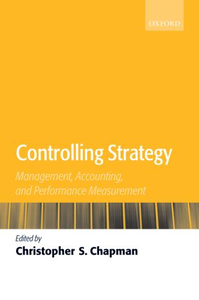Content and process approaches to studying strategy and management control systems
Chenhall, Robert H. (2005) Content and process approaches to studying strategy and management control systems. In: Chapman, Christopher S., (ed.) Controlling Strategy: management, accounting, and performance measurement. Oxford University Press, New York, USA, pp. 10-36.
|
PDF (Published Version)
- Published Version
Restricted to Repository staff only |
||
![[img]](https://researchonline.jcu.edu.au/14415/2.hassmallThumbnailVersion/14415_Chenhall_2005_front_cover.jpg)
|
Image (JPEG) (Front Cover)
- Cover Image
Download (11kB) |
Abstract
[Extract] This chapter is concerned with developing our understanding of the role of management control systems (MCS) in formulating and implementing strategy. Strategy has become a dominant influence in the study of organizations. Researchers in areas such as economics (Milgrom and Roberts 1992; Seth and Thomas 1994), human resource management (Miller 1991; Kochan and Osterman 1994), information technology (IT) (Grover et al. 1997), and organizational behaviour (Knights and Morgan 1991; Rowe et al. 1994; Rouleau and Seguin 1995) all seek to understand the ways in which their disciplines assist in understanding how managers use strategy to achieve desired outcomes. Management accounting has been informed by these literatures to such an extent that strategic management accounting is seen by many commentators as the key to understanding the effective design and implementation of MCS (Simmonds 1981; Bromwich 1990; Ward 1992).
Costing has developed a strategic focus whereby activity-based cost management (ABCM) has moved from refining the attribution of fixed costs to cost objects to systems that link costs and value drivers to alternate strategies, thereby enabling cost-benefit analysis and an understanding of process requirements to effect strategies (Shank and Govindarajan 1995; Kaplan and Cooper 1998). Performance measurement has evolved from enhancing the usefulness of performance measures by including both financial and non-financial measures to more complex systems based on a balanced suite of measures that provides strategic performance management, including causal maps that show the operational implications for different strategies (McNair et al. 1990; Kaplan and Norton 1992, 1996, 200l). More recently, attention has been focused on how MCS can be used interactively to assist in developing responsiveness throughout the organization to the strategic uncertainties facing the organization (Simons 1995, 2000). These advances are reflected in the emphasis given in most contemporary management accounting textbooks to a strategic orientation to management control.
This chapter draws on the distinction between content and process approaches to help develop understanding of existing strategy-based MCS research and provide a unifying perspective for thinking about a future research agenda. The potential contribution is to clarify the different purposes of content and process approaches, thereby opening debate to reflect on past findings in management control research. Also, a variety of issues concerning both content and process are presented as key areas for future research. First, the difference between content and process approaches is discussed. Second, the ways in which management control has been related to content approaches is examined and the potential for future research in this area explored. Third, process approaches are examined, again with an eye to the extant literature and future directions. Finally, the issue of strategic change is discussed to show how both content and process approaches can help consideration of this research agenda.
| Item ID: | 14415 |
|---|---|
| Item Type: | Book Chapter (Research - B1) |
| ISBN: | 978-019-928063-6 |
| Keywords: | management control systems; strategy |
| Date Deposited: | 03 Nov 2010 03:49 |
| FoR Codes: | 15 COMMERCE, MANAGEMENT, TOURISM AND SERVICES > 1501 Accounting, Auditing and Accountability > 150105 Management Accounting @ 100% |
| SEO Codes: | 91 ECONOMIC FRAMEWORK > 9104 Management and Productivity > 910402 Management @ 100% |
| Downloads: |
Total: 184 Last 12 Months: 4 |
| More Statistics |



